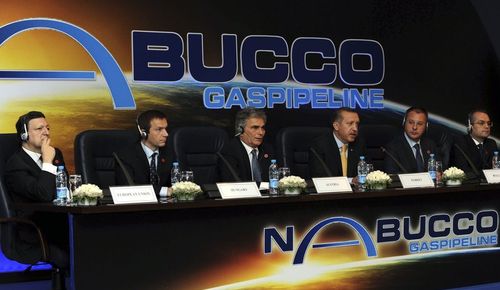
Nabucco Gas Project Retains Political and Business Momentum
Publication: Eurasia Daily Monitor Volume: 7 Issue: 25
By:

On February 3, the Bulgarian parliament ratified the inter-governmental agreement on the Nabucco gas transport project, as signed in July 2009 by the five stakeholder countries (the German company RWE being the sixth stakeholder) (BTA, February 3). The Bulgarian ratification vote was unanimous, implicitly confirming the country’s preference for the Nabucco project over Gazprom’s South Stream. The previous, Socialist Bulgarian government had joined South Stream in 2008; but Russia’s January 2009 gas supply cut-off (which targeted Ukraine, but hit Bulgaria the hardest) caused even the Russia-friendly parties in Bulgaria to lose confidence in the country’s reliability as a supplier.
The new conservative government under Boiko Borissov, in office since July 2009, took it one step further by questioning the South Stream project’s intrinsic terms and ordering a re-examination. In the parliament’s ratification debate, the socialist opposition fully supported Nabucco, but also called for Bulgaria to continue participation in South Stream. Other countries in the Nabucco project are also retaining a South Stream option. They see EU-backed alternatives being slow to materialize, US leadership fading, and national electorates expecting their governments to demonstrate a proactive approach to energy security (EDM, February 1).
At the same time, Bulgaria and Greece are finalizing the construction of an inter-connector between their respective gas transmission networks. The link can serve to supply Bulgaria in emergency situations with gas volumes from the Turkey-Greece-Italy inter-connector. Bulgaria and Romania are scheduled to link their networks in 2011, creating additional supply options in emergencies. These are hedges against possible Russian supply cut-offs, but are neither alternatives, nor significant complements to Russian-delivered gas until Nabucco becomes reality.
Hungary was the first country whose parliament ratified the Nabucco inter-governmental agreement. Nabucco tops Hungary’s official energy policy priorities, with LNG from the Adriatic coast as the second priority, and South Stream third. The Austrian parliament has also ratified the Nabucco inter-governmental agreement. Turkey’s energy ministry has announced that the parliamentary ratification in Ankara is imminent (Platt’s Commodity News, January 22, February 4). The Romanian ratification has been delayed by the country’s lengthy government crisis and its recent presidential election; but ratification is a foregone conclusion, as the country stayed out of the South Stream project, despite Gazprom’s entreaties to join it. Moscow is inviting the Austrian government even more insistently to join South Stream.
The Austrian OMV company originated the Nabucco project nearly a decade ago and OMV executives have, all along, led the project company although the latter is a separate entity, with OMV’s Gas and Power division being one of the six Nabucco stakeholders. On January 28, at the European Gas Conference in Vienna, the OMV Gas and Power Head, Werner Auli, declared that the Nabucco pipeline would not be built without sufficient demand from gas shippers to use the pipeline’s capacities; and this would have to be determined by the end of 2010. Some mass media reports created considerable confusion by focusing on the statement’s introductory, negative proposition and overlooking the remainder. In fact, Auli went on to note a high probability of plentiful demand from shippers to book capacities in the planned Nabucco pipeline (Wiener Zeitung, January 28).
The Nabucco consortium has scheduled an “open season” (the tendering process whereby gas shippers book pipeline capacities) to be held from July to October 2010. If successful, the open season should be followed by the final investment decision by the end of the year. In accordance with European Union legislation, the Nabucco company may not sell gas to other parties, but only transport it. Under the same legislation, 50 percent of the pipeline’s transport capacities must be tendered out in the open season. According to Auli and the Nabucco project managing director (formerly OMV executive) Reinhard Mitschek, Nabucco will offer long-term transportation contracts of 20 to 25 years, so as to reassure financial investors (Dow Jones, February 1).
OMV, as well as Turkey, have all along favored allowing Russia’s Gazprom to use some capacity in the planned Nabucco pipeline. OMV and the Austrian government have agreed to share Nabucco’s terminus and distribution center at Baumgarten near Vienna in parity with Gazprom. For its part, Ankara encourages Gazprom to increase deliveries via the Blue Stream Two pipeline on the seabed of the Black Sea to Turkey, and connect with the Nabucco pipeline, as well as using part of Nabucco’s capacity to pump Gazprom’s gas to Europe. These proposals could, however, compromise the Nabucco project’s significance for energy security to the region and as a centerpiece to the EU-planned Southern Corridor.




